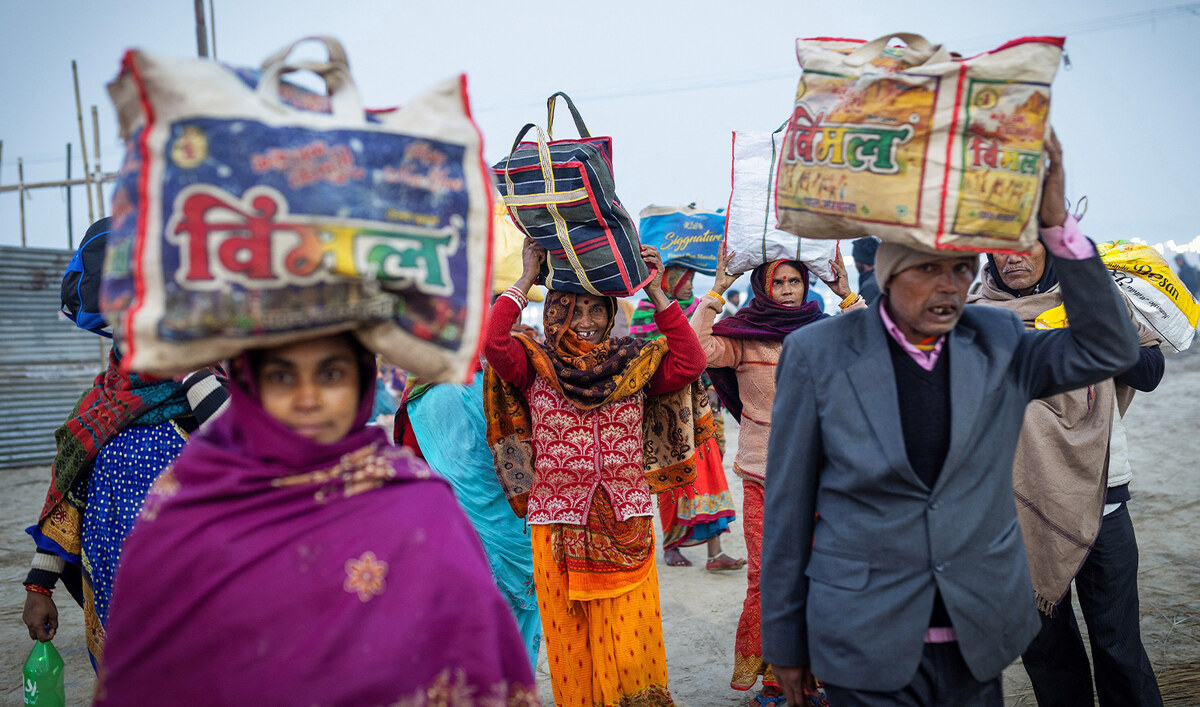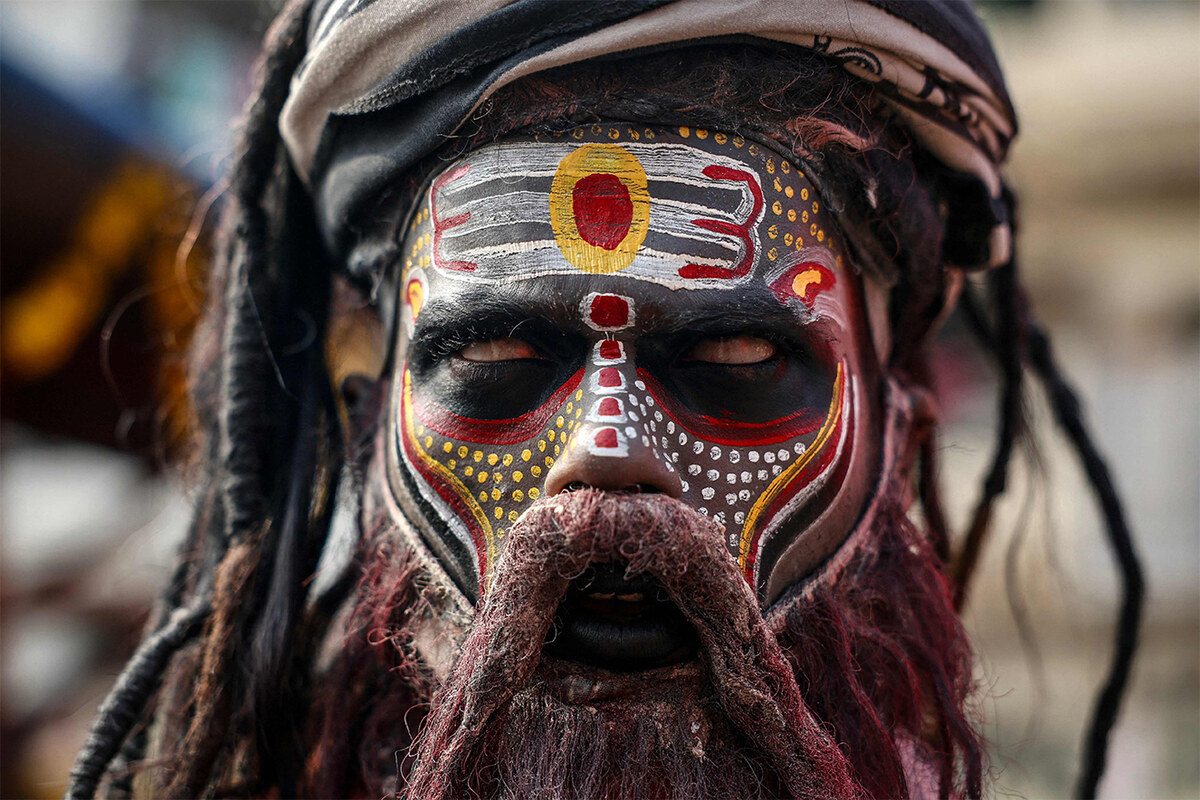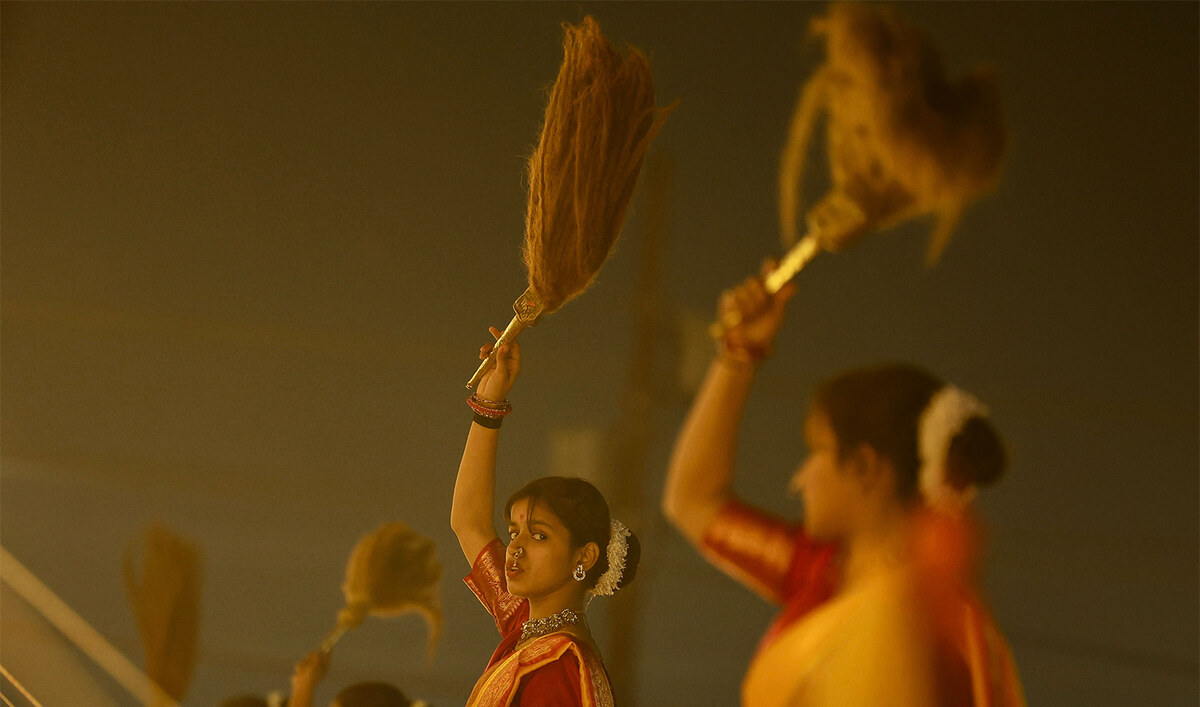JERUSALEM: The White House said Sunday that “it’s the right time” for Israel to scale back its military offensive in the Gaza Strip, as Israeli leaders again vowed to press ahead with their operation against the territory’s ruling Hamas militant group.
The comments exposed the growing differences between the close allies on the 100th day of the war.
Also Sunday, Israeli warplanes struck targets in Lebanon following a Hezbollah missile attack that killed two Israeli civilians — an older woman and her adult son — in northern Israel. The exchange of fire underscored concerns that the Gaza violence could trigger wider fighting across the region.
The war in Gaza, launched by Israel in response to the unprecedented Oct. 7 attack by Hamas, has killed nearly 24,000 Palestinians, devastated vast swaths of Gaza, driven around 85 percent of the territory’s 2.3 million residents from their homes and pushed a quarter of the population into starvation.

A picture taken from Rafah shows smoke billowing over Khan Yunis in the southern Gaza Strip during Israeli bombardment, as the war between Israel and the Palestinian militant group Hamas enters its 100th day on January 14, 2024 (Photo by AFP)
Speaking on CBS, White House National Security Council spokesman John Kirby said the US has been speaking to Israel “about a transition to low-intensity operations” in Gaza.
“We believe it’s the right time for that transition. And we’re talking to them about doing that,” he said on “Face the Nation.”
Israel launched the offensive after the Hamas attack killed some 1,200 people, mostly civilians, and took 250 others hostage. Prime Minister Benjamin Netanyahu has vowed to press ahead until Hamas is destroyed and all of the more than 100 hostages still in captivity are freed.
The war has sent tensions soaring across the region, with Israel trading fire almost daily with Lebanon’s Hezbollah militant group and Iranian-backed militias attacking US targets in Syria and Iraq. In addition, Yemen’s Houthi rebels have been targeting international shipping, drawing a wave of US airstrikes last week.
Hezbollah’s leader, Hassan Nasrallah, said his group won’t stop until a ceasefire is in place for Gaza.
“We are continuing, and our front is inflicting losses on the enemy and putting pressure on displaced people,” Nasrallah said in a speech, referring to the tens of thousands of Israelis who have fled northern border areas.
In other developments, tens of thousands of people in Europe and the Middle East took to the streets Sunday to mark the 100th day of the war. Opposing demonstrations either demanded the release of Israeli hostages held by Hamas or called for a ceasefire in Gaza.
In Israel, supporters of the hostages and their families wrapped up a 24-hour protest in Tel Aviv calling on the government to win their immediate release.
INTERNATIONAL PRESSURE
The unprecedented level of death and destruction in Gaza has led South Africa to lodge allegations of genocide against Israel at the International Court of Justice. Israel denies the accusations and has vowed to press ahead with its offensive even if the court in The Hague issues an interim order for it to stop.
Israel has also been under growing international pressure to end the war in Gaza, but it has so far been shielded by US diplomatic and military support. Israel argues that any ceasefire would hand victory to Hamas, which has ruled Gaza since 2007 and is bent on Israel’s destruction.
“It’s been 100 days, yet we will not stop until we win,” Defense Minister Yoav Gallant said Sunday.
But differences with the Americans have begun to emerge. During a visit to the region last week, Secretary of State Antony Blinken renewed his calls on Israel to do more to reduce civilian casualties and increase the supplies of desperately needed humanitarian aid entering Gaza.
In recent weeks, Israel has scaled back operations in northern Gaza, the initial target of the offensive, where weeks of airstrikes and ground operations left entire neighborhoods in ruins.
Kirby, the White House spokesman, acknowledged that Israel had taken some “precursory steps” toward scaling back the offensive. But he said there was more to do.
“We’re not saying let your foot up off the gas completely and don’t keep going after Hamas,” he said. “It’s just that we believe the time is coming here very, very soon for a transition to this lower intensity phase.”
FEARS OF A SECOND FRONT
The deadly Hezbollah missile strike in northern Israel renewed concerns about a second front erupting into full-blown war.
It came shortly after the Israeli army said it killed three Lebanese militants who tried to infiltrate Israel.
Late Sunday, the Israeli military said it had struck Lebanon in response to the missile strike. Israeli officials said a woman in her 70s and her son, in his 40s, were killed in the town of Yuval.
The army’s chief spokesman, Rear Adm. Daniel Hagari, said Israel would not tolerate attacks on civilians.
“The price will be extracted not just tonight, but also in the future,” he said.
Yuval is one of more than 40 towns along Israel’s northern border evacuated by the government in October. Israeli media reported that the family stayed in the area because they work in agriculture.
Tensions have also spread to the Israeli-occupied West Bank, where Palestinian health officials say nearly 350 Palestinians have been killed by Israeli fire in confrontations throughout the war.
On Sunday, the Israeli army said troops opened fire after a Palestinian car breached a military roadblock in the southern West Bank and an attacker fired at soldiers. Palestinian health officials said two Palestinians were killed.
Late Sunday, Palestinian health officials said two teenage boys were killed by Israeli fire. The army said it shot them after they threw a bomb at an army base.
ISRAEL STRIKES CENTRAL, SOUTHERN GAZA
Israel has launched major operations against the southern city of Khan Younis and built-up refugee camps in central Gaza.
“No one is able to move,” said Rami Abu Matouq, who lives in the Maghazi camp. “Warplanes, snipers and gunfire are everywhere.”
In the central town of Deir Al-Balah, health officials said at least 15 people were killed in Israeli strikes late Saturday.
At the entrance of the Al-Aqsa Martyrs Hospital, men lined up to pray for the dead, their bodies wrapped in white shrouds. The bodies were put on the back of a pickup truck before they were taken to be buried.
Meanwhile, the Egyptian TV station Al-Ghad said a cameraman was killed in an Israeli airstrike in northern Gaza. The channel said Yazan Al-Zwaidi was apparently in a crowd of people at the time. Details were not immediately available, and the Israeli military had no comment.
The Internet advocacy group Netblocks said communications in Gaza were still out after a 48-hour outage. The Palestinian telecommunications operator in Gaza, Jawwal, said two of its employees were killed Saturday when they were hit by a shell while fixing lines in Khan Younis.
The Gaza Health Ministry said Sunday that hospitals had received 125 bodies in the last 24 hours, bringing the overall death toll to 23,968. The ministry does not differentiate between civilians and combatants but says around two-thirds of the dead are women and minors. It says over 60,000 people have been wounded.
Israel says Hamas is responsible for the high civilian casualties, saying its fighters make use of civilian buildings and launch attacks from densely populated urban areas. The military says 189 soldiers have been killed and 1,099 wounded since the start of the ground offensive.






























